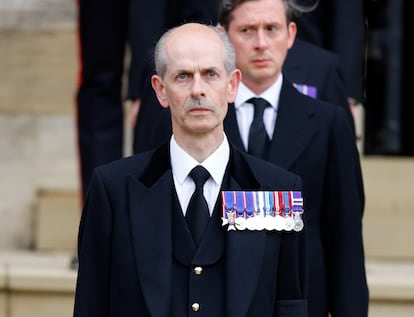Paul Whybrew, the man who will decide which of Queen Elizabeth’s secrets will come to light
The royal aide served the monarch for 44 years and became one of her closest confidants. Now, Charles III has entrusted him with deciding which of his mother’s private documents may be published in the coming years in the Royal Archives

Every night since she was 15 years old, Elizabeth II sat at her desk and wrote in her journal, a custom she in all probability inherited from her father, King George VI. It is known that the Queen of the United Kingdom ordered her staff not to interrupt her writing at the end of her day, except in cases of national emergency. It is also known that she wrote in black leather notebooks and that every morning she asked for the blotting paper she had used the night before to be destroyed, so that no one could decipher the contents of what she wrote. It is known that only Elizabeth II herself had the key to the drawer in her office where she kept her precious notebook. And it is known that only her husband, Prince Philip, Duke of Edinburgh, skimmed over the pages. Little else is known about the journals that the queen filled religiously for 81 years. Now it is another man, Paul Whybrew, the monarch’s most trusted aide, who will have access to the journals and decide whether their daily entries will be made public or remain private.
Until Queen Elizabeth’s death last year, Whybrew’s official title was Page of the Backstairs. But the exact tasks of Paul Whybrew, 64, who served the Queen of England for 44 years, were difficult to classify. On paper, his job was to attend to the queen’s daily needs: from waking her up for breakfast and managing her correspondence and phone calls to receiving her visitors and taking care of her beloved corgi dogs. After so many years in service, Whybrew — who is known in the palace as Tall Paul due to his height (192 centimeters) — became one of the people closest to Elizabeth II. The two shared the same sense of humor, and the queen sometimes invited Whybrew to watch television with her or help her finish her puzzles. Elizabeth II considered him such a loyal person that she even awarded him the Royal Victorian Medal, which recognizes services to the queen.
Like the crown itself, King Charles III has also inherited his mother’s trust in Whybrew. The king has entrusted him with reviewing his mother’s letters, diaries and other private documents, alongside a team, who will decide which parts will remain confidential and which can be published in the coming years in the Royal Archives. There is a precedent, created by Elizabeth II herself, who in 2012 authorized the release of the diaries of her great-great-grandmother, Queen Victoria. She also began writing at an early age, specifically at the age of 13, and maintained the habit until 10 days before her death. In total, she filled 121 journals. After her death in 1901, it was his daughter, Princess Beatrice, turned literary executor, who reread all her diaries and, following her mother’s instructions, eliminated everything that could upset the British royal family. Of this edition, 111 volumes remained. These journals are available from the Windsor Castle Royal Archives and also via their website.

Paul Whybrew became world-famous on July 9, 1982. It was that day when the Irishman Michael Fagan entered Queen Elizabeth’s room at Buckingham Palace in what was the biggest security breach the British monarchy had seen in the 20th century. “I was scareder than I’d ever been in my life,” Fagan told the British tabloid The Independent in 2012, in reference to the moment he drew the curtains and woke up Queen Elizabeth. “Then she speaks, and it’s like the finest glass you can imagine breaking: ‘[What] are you doing here?!’” According to a Scotland Yard report, the queen managed to remain calm and had a 10-minute conversation with him. Before being arrested by the police, he was found by Paul Whybrew, who managed to calm the young man by offering him a cigar and a glass of Scotch whiskey in his own office.
Since then, his tall figure has always discreetly appeared behind Elizabeth II, both in large celebrations and in smaller events. His name popped up again during the Covid-19 lockdown, when it became known that he was one of the few people who, along with Angella Kelly, the queen’s personal assistant and wardrobe manager, and the Duke of Edinburgh, were exempted from the social distancing restrictions and allowed near the monarch. He was also in the background on September 19, 2022, during the state funeral for Elizabeth II. Tall Paul could be seen walking behind the coffin in the procession to Westminster Abbey, just behind the queen’s family retinue.
Sign up for our weekly newsletter to get more English-language news coverage from EL PAÍS USA Edition
Tu suscripción se está usando en otro dispositivo
¿Quieres añadir otro usuario a tu suscripción?
Si continúas leyendo en este dispositivo, no se podrá leer en el otro.
FlechaTu suscripción se está usando en otro dispositivo y solo puedes acceder a EL PAÍS desde un dispositivo a la vez.
Si quieres compartir tu cuenta, cambia tu suscripción a la modalidad Premium, así podrás añadir otro usuario. Cada uno accederá con su propia cuenta de email, lo que os permitirá personalizar vuestra experiencia en EL PAÍS.
¿Tienes una suscripción de empresa? Accede aquí para contratar más cuentas.
En el caso de no saber quién está usando tu cuenta, te recomendamos cambiar tu contraseña aquí.
Si decides continuar compartiendo tu cuenta, este mensaje se mostrará en tu dispositivo y en el de la otra persona que está usando tu cuenta de forma indefinida, afectando a tu experiencia de lectura. Puedes consultar aquí los términos y condiciones de la suscripción digital.









































